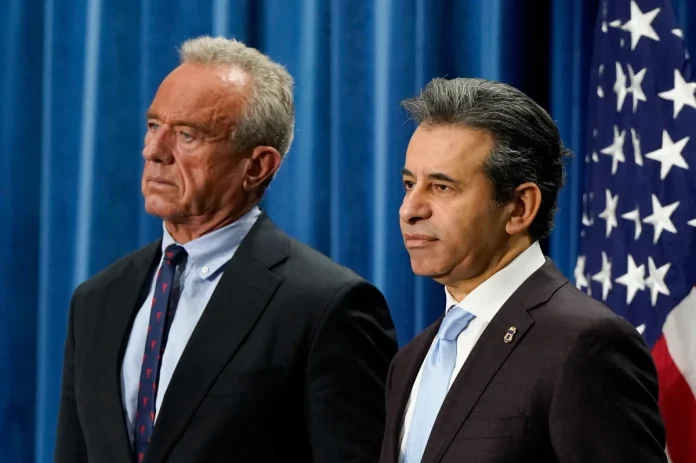US authorities remove strong safety warnings on menopause hormone therapy, saying risks were exaggerated and outdated for newly menopausal women.
WASHINGTON: The United States will remove strong safety warnings from many hormone therapies used to alleviate menopausal symptoms, authorities announced Monday.
Health officials stated that previous warnings had exaggerated the risks associated with hormone replacement therapy.
Hormone Replacement Therapy replaces estrogen that the female body stops producing during menopause.
It aims to alleviate symptoms including hot flashes, brain fog, insomnia, night sweats and joint pain.
Prescription rates plummeted worldwide after a landmark early 2000s trial highlighted risks with specific HRT formulations.
Since then, “black box warnings” – the strongest FDA requirement – highlighted increased risks including certain cancers, cardiovascular conditions and probable dementia.
Critics noted flaws in the Women’s Health Initiative study that prompted the original warnings.
That study focused on women who were a decade post-menopause and in their 60s, when cardiovascular risks naturally increase.
Current guidance indicates healthy newly menopausal or perimenopausal women in their 40s or 50s may be treatment candidates.
Newer, more localized or lower-dose therapy forms are now available.
“We’re challenging outdated thinking and recommitting to evidence-based medicine that empowers rather than restricts,” US health chief Robert F. Kennedy Jr said.
Many experts had urged revisiting the black box label, which they said scared women for whom benefits may outweigh risks.
Others expressed concern that changes shouldn’t occur without rigorous review.
“The warnings on hormone products for menopause had become outdated and it was time to update them,” said Diana Zuckerman of the National Center for Health Research.
She noted “these products still have clear risks and the benefits are mostly for hot flashes and related symptoms.”
FDA head Marty Makary dismissed the need for an independent review committee, calling them “bureaucratic, long, often conflicted and very expensive.”
Over the summer, Makary convened a panel of experts overwhelmingly in favor of HRT, including people with pharmaceutical lobbying ties.
Adriane Fugh-Berman of Georgetown University called Monday’s announcement “embarrassing” as it preceded consensus and was “not how regulation should happen.”
She acknowledged potential HRT benefits for some but cautioned that real risks remain and more study is needed.
Steven Fleischman of the American College of Obstetricians and Gynecologists commended the FDA’s move.
“The updated labels will better allow patients and clinicians to engage in a shared decision-making process,” Fleischman said.
He emphasized distinguishing between systemic estrogen products and low-dose vaginal estrogen.
“Like all medications, systemic estrogen products are not without risk,” Fleischman noted.
The FDA confirmed it will not remove the boxed warning for endometrial cancer for systemic estrogen-alone products.
Sarah Shealy, a certified practitioner with the Menopause Society, welcomed the policy shift.
She hoped it signaled “the tide is turning” in treatment access and education.
“We largely have a medical community that doesn’t have broad knowledge or confidence in prescribing hormone therapy,” Shealy said. – AFP







